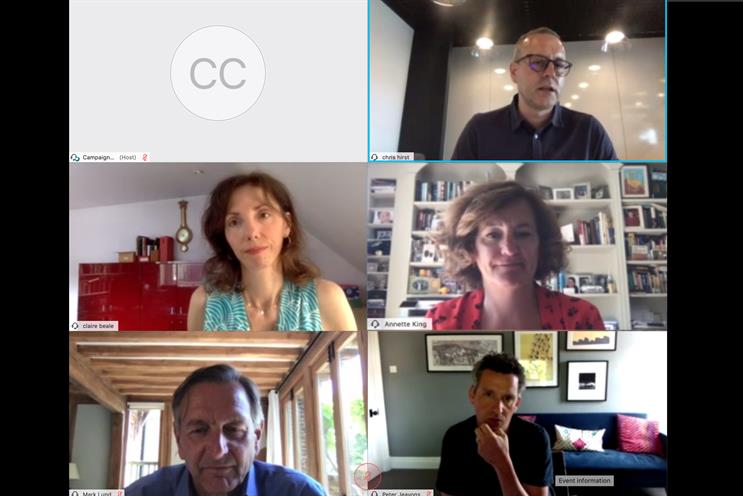
Advertising agencies are going to have to seriously consider the role of the office in a culture where staff have proven they can work effectively from home during lockdown conditions, network bosses have stressed.
Speaking at today’s 北京赛车pk10 Connect event, three network agency bosses and BT’s marketing chief revealed how their businesses have had to adapt to a workforce stuck at home and what permanent features of lockdown will remain in the future.
Mark Lund, recently promoted to president of UK and Europe at McCann Worldgroup, warned that agencies are being deprived of "happy accidents" that come from working in an office environment, such as impromptu conversations in communal areas that can build morale and spark ideas.
The Interpublic group is in the process of moving all of its London companies to a single site and Lund insisted he wants to make sure the environment maximises opportunities for staff to mix and collaborate.
He said: "You can get a lot of human expression and meaning through video calls, but you don’t get happy accidents through conversations that happen on the way to the meeting or waiting for coffee. Those things in a business like ours are so precious and we miss them. I didn’t quite realise how valuable those were."
Chris Hirst, global chief executive of Havas Creative Group, went further and predicted that the ad industry is going to have to ask serious questions about what office spaces are really for now that companies have proved how effective they can be working at home.
He said: "There’s a weird dichotomy between how surprised we were at how effective we could be with being at home… but on the other hand, how surprised we were by how intense it is. By week one or two, there was that really deep exhaustion we all felt after spending so much time on video calls. So much of being ‘at work’ isn’t just doing that transactional thing; it’s about the way we let off steam and release stress through collaboration, making friends or going for a coffee or going to the pub.
"Yeah, we can function outside of the business, but no way do we function as well as when we have at least some people in the building all the time. A key question we’re going to have to ask and answer, not just in our industry, is: what is this space really for? Maybe it’s like how Apple use their Apple stores instead of how Tesco use their stories. That not only allows us to change our real estate costs, but also transform our business for the better."
Annette King, chief executive of Publicis Groupe UK, a network of 27 agencies and companies, revealed that she hasn’t seen a written meeting agenda for three months, such is the changed nature of meetings via video-conferencing software.
"We’ve tried to make sure we’re coming our with a fit-for-purpose and fit-for-future shaped company," she said in a response to 北京赛车pk10 global editor-in-chief Claire Beale’s question about how Publicis had been coping during the crisis.
"We’ve introduced stand-up meetings; the whole thing is around daily communication and these regular meetings or points of contact… There’s an overall agenda, but I haven’t seen a written agenda in three months – the style of communication has changed."
King explained that 12 people in senior leadership roles across Publicis in the UK have been dialling into a daily midday meeting since 4 March, when the company discovered its first staff member had tested positive for Covid-19.
"We realised we needed a Cobra-style daily meeting and we’re still doing that. The content has changed, but we’ve bonded more and we can make rapid decisions," she added.
Pete Jeavons, marketing director at BT and sister mobile network brand EE, which employs Publicis agencies Saatchi & Saatchi and Publicis.Poke, described how the crisis has forced a change in the agency and client relationship.
"There’s definitely a sense of, because the crisis itself was new to everyone, the way we’ve come together as client and agency to work through our problems, instead of a linear brief into an agency – we’ve changed the way we work and we address problems head-on."
BT has also set up daily meetings between the marketing team and its agencies that range between five minutes and an hour depending on needs.
Lund quipped that he had "travelled" to New York, Germany, Italy and Romania in the past week – all over video conference from home – and concluded that he can’t imagine ever travelling as much to the office or to other countries in the future.
He now believes the ad industry has the opportunity to "strip away some of the show and ceremony" that agencies have tended to put on for clients in the past and instead focus on creating value for brands.
Lund added: "The exciting thing is that we maximise our most valuable asset, which is our people and the ability for them to be insightful and creative meaningful results for brands… We’ve seen different sides of clients over the last few months, they’ve seen us in our kitchens – there’s more human, almost vulnerable reality to it… Our people have collaborated brilliant with each other and clients under extraordinary circumstances. I don’t want to lose that when we got back to a formal place of work."
King, meanwhile, admitted that creative agencies had found the lockdown period more difficult than media shops due to enormous constraints being put on production.


